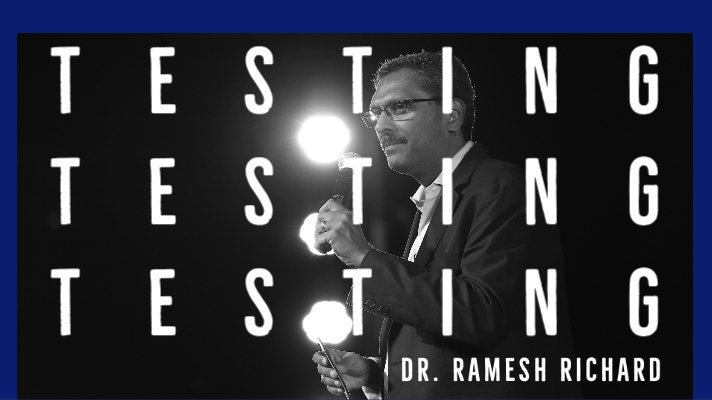
The Wisdom of God
October 4, 2018
The Art of Giving Tough Feedback In The Church
October 11, 2018Influence of the Bible: Bible Engagement and Daily Conversations

By Dr. Lloyd Estrada
I am sure that you are familiar with the following words and phrases:
“scapegoat” a person who is blamed for the mistake or wrongdoing of someone else
“drop in a bucket” a very small amount; less than nothing
“the powers that be” important people that have authority over others
“put words in one’s mouth” to falsely attribute a statement to someone
“fall from grace” to fall out of favor; to have one’s reputation tarnished
“labor of love” work done for the benefit of others rather than for material gain
“the blind leading the blind” a situation wherein an incompetent person is guiding an equally incompetent person
“eat, drink and be merry” to enjoy life as much as possible because life is short
“rise and shine” wake up and get going

These are expressions we use in our daily conversations. But do you know that these phrases originated from the Bible, particularly the King James Version? Here are the passages where these expressions came from.
- For which of you, intending to build a tower, sitteth not down first, and counteth the cost, whether he have sufficient to finish it? (Luke 14:28)
- And Aaron shall cast lots upon the two goats; one lot for the Lord, and the other lot for the scapegoat. (Leviticus 16:8)
- Behold, the nations are as a drop of a bucket, and are counted as the small dust of the balance: behold, he taketh up the isles as a very little thing. (Isaiah 40:15)
- Let every soul be subject unto the higher powers. For there is no power but of God: the powers that be are ordained of God. (Romans 13:1)
- And come to the king, and speak on this manner unto him. So Joab put the words in her mouth. (2 Samuel 14:3)
- Remembering without ceasing your work of faith, and labour of love, and patience of hope in our Lord Jesus Christ, in the sight of God and our Father. (1 Thessalonians 1:3)
- Let them alone: they be blind leaders of the blind. And if the blind lead the blind, both shall fall into the ditch. (Matthew 15:14)
- Then I commended mirth, because a man hath no better thing under the sun, than to eat, and to drink, and to be merry: for that shall abide with him of his labour the days of his life, which God giveth him under the sun. (Ecclesiastes 8:15)
- Arise, shine; for thy light is come, and the glory of the Lord is risen upon thee. (Isaiah 60:1)
The Reader’s Digest declares that “No book in history has contributed more phrases to the English language than the King James Bible.” In fact, there are at least 122 everyday expressions in the English language that have their origins in the Bible.

How did this happen?
The answer to this question requires a lengthy study on the history of literacy, Bible translation and the Reformation. However, let me give a very simple explanation. Vishal Mangalwadi in The Book that Made Your World, observed: “When Europeans became literate, the only book most families owned was the Bible, and it became the source of their language and their worldview.”
Therefore, when English-speakers engaged the Bible through the centuries, particularly the King James Version, they incorporated many expressions and concepts from the Bible in their daily conversations. So, the next time you hear someone use expressions like “baptism of fire,” “thorn in the flesh,” “by the skin of your teeth,” “flesh and blood,” “how the mighty have fallen,” etc. you could tell them, “Oh, I am glad you quote the Bible when you speak!”
A Word to Pastoral Trainers
Today, let us strive toward influencing the development of our respective languages by intentionally including the Word of God in our daily conversations. To help make this happen, we must increase our Bible engagement. Colossians 3:16 reminds us to:
Let the word of Christ dwell in you richly in all wisdom; teaching and admonishing one another in psalms and hymns and spiritual songs, singing with grace in your hearts to the Lord.
- Embrace the truth that the Bible is powerful to influence various aspects of life including language development.
- Model a love for the Word of God by immersing yourself in it. Read your Bible. Feast on the Word of God.
- Empower other leaders to develop the habit of reading the Word of God, reflecting on its meaning, and responding in obedience to what God is saying. A good starting point is by using the goTandem Bible Engagement app (free download for iOS and Android).
- Encourage the public reading of Scripture (1 Timothy 4:13). Read Devote Yourself to the Public Reading of Scripture by Jeffrey D. Arthurs (Kregel Publications, 2012).
The more we have the Word of God in our hearts and minds, the more likely will we find it in our speech.
About the Author
 Dr. Lloyd Estrada is the Bible Engagement Advocate of the World Evangelical Alliance. He has also served as pastor, church planter and missions mobilizer over the past 30 years. He is an Elder of Greenhills Christian Fellowship. Lloyd and his wife Dahl have been married for 30 years now. They have two adult sons. Dr. Estrada can be reached at .
Dr. Lloyd Estrada is the Bible Engagement Advocate of the World Evangelical Alliance. He has also served as pastor, church planter and missions mobilizer over the past 30 years. He is an Elder of Greenhills Christian Fellowship. Lloyd and his wife Dahl have been married for 30 years now. They have two adult sons. Dr. Estrada can be reached at .


